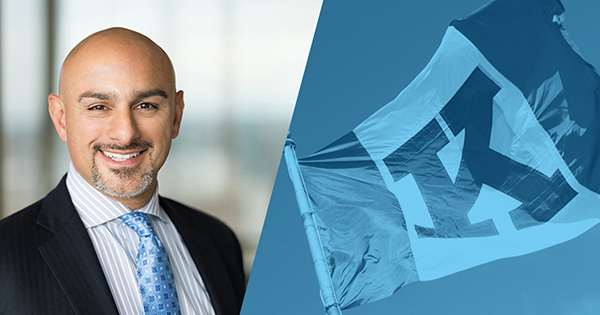Leading in a Tech-Driven World

Alumni Profile: Mauricio Uribe, L'98
When Mauricio Uribe graduated from KU Law, Pearl Jam dominated the music charts, Furbies were flying off shelves and DVDs were a fresh innovation. That was 1998. Today, Uribe is a partner at Knobbe Martens in Seattle, helping clients navigate cutting-edge fields like artificial intelligence (AI), blockchain and other emerging technologies.
Uribe graduated from the University of Missouri in 1995 with bachelor’s degrees in electrical and computer engineering. His decision to study law was inspired by an “aha moment” when his Beta Theta Pi fraternity brothers introduced him to the field of intellectual property law. Uribe said he always had an interest in law, but didn’t know there was a way to mesh his technical background and legal interests together.
With a vision of practicing in Kansas City, Uribe set his sights on KU Law. Once there, he explored a variety of interests. While intellectual property stood out, he also delved into tax law and participated in the Defender Project, now called the Paul E. Wilson Project for Innocence & Post-Conviction Remedies.
After graduating, Uribe worked in Kansas City for two years before recognizing a shift in intellectual property trends on the East and West Coasts. He and his wife decided to relocate, and that decision proved transformative.
Now, Uribe is a partner and leads the Software/IT and Electrical and Data Privacy practice groups at Knobbe Martens in Seattle, Washington. Initially envisioning a career in litigation focusing on hardware and consumer products, he instead found himself specializing in software and emerging technologies, without ever stepping foot into a courtroom. Uribe’s work spans licensing, portfolio strategy and helping clients navigate the complexities of modern IP law.
Reflecting on the field’s evolution and his career, Uribe emphasized the importance of continuous learning. Technologies such as blockchain, AI and even the internet were nonexistent or in their infancy when he began his career. Today, they present both exciting opportunities and unique challenges.
“I have a solid base in terms of technical knowledge, but it's your ability and passion for learning that really drives this practice,” he said. “There's always that challenge, to stay up to date with technologies, try to identify the trends, learn new technologies and understand how the legal practice, especially in intellectual property protection, applies to those new technologies.”
Emerging technologies have reshaped the landscape of intellectual property law, requiring attorneys to address unprecedented legal questions. The rise of generative AI, for instance, has brought copyright law to the forefront, raising issues about data usage and creative ownership. Uribe pointed out that traditional legal frameworks, some of which date back to the 18th century, often struggle to address the nuances of modern technological advancements.
“Some of the statutes that govern patent applications and technology were written at a time when a hay baler was cutting-edge technology,” he said.
Even with decades of experience, Uribe considers himself a perpetual student. Each day, he invests in learning about the latest legal and technological developments. He takes particular pride in building strong client relationships and witnessing the tangible impact of his work. Whether it’s helping a small inventor protect their life’s work or devising a strategy that enables a company to secure funding, these experiences underscore the meaningful contributions lawyers can make.
“I love feeling like I'm in partnership with my clients. I work very hard for them; I’m very loyal to them, whether it's buying their product, using their product or knowing everything I can about their company and how they operate,” he said. “I put a lot of energy into the relationship, and they do the same, and that's mutually beneficial.”
Uribe also credits his success to collaboration. At Knobbe Martens, he has access to colleagues with expertise across various legal and technical fields.
“Sometimes, there are areas of law or areas of tech that I clearly don't have expertise in, and I can rely on my partners or other associates to help me,” he said.
Ultimately, Uribe’s career demonstrates the potential for lawyers to not only adapt to change but to shape it. By combining technical expertise, legal awareness and a commitment to mentorship, he exemplifies the evolving role of intellectual property lawyers in a rapidly changing world.
This article appeared in print in the 2024 KU Law Magazine.